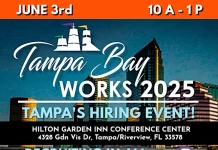By Stacy M. Brown, NNPA Newswire Senior National Correspondent
@StacyBrownMedia
The pandemic spurred a new and continuing phenomenon: “the Great Resignation.”
Armed with a new sense of values and the realization that they do not have to actually go into an office environment to perform assigned tasks, American workers have continued switch jobs — or leave the traditional workforce entirely.
According to some reports, the pandemic experience has contributed to changing perceptions about what matters to employees — including what they want from their jobs – leading to a disconnect between upper management and front-line workers.
Unlike many older professionals, that may simply complain to co-workers, look for a new job and then submit their letter of resignation, GenZ and younger Millennials are speaking up about what they want their workplace to look like — and feel like. Something that no prior generations have done as directly.
“Many GenZ workers got their first job during the pandemic, so they expect flexibility and remote work as the standard option. In addition, they view jobs as ‘experiences’ that they can end if they no longer need or feel connected to them,” said Dr. Ximena Hartsock, founder of BuildWithin.
This D.C.-based company identifies, trains, and manages tech-related apprentices.
“And, they have always been presented with a ‘buyers’ market,’ in terms of jobs which has led to job-hopping, which is unlikely to go away and puts pressure on employers to lead with an employee-centric and value-driven culture,” Hartsock insisted.
“This new generation is putting needed pressure on employers to make the workplace more empathetic. Perhaps the Great Resignation will transition to the Great Enlightenment.”
Mark Pierce, CEO of Cloud Peak Law Group, said he believes that employees aren’t feeling valued or that their working location puts them at a disadvantage. He said that’s a primary contributor to the Great Resignation.
“Whether employees are working in-person, fully remote, or hybrid, it’s important to ensure that everyone feels welcome and valued in their roles,” Pierce stated.
He noted that focusing on company culture and giving employees autonomy are solutions.
“It can be easier to focus on employees who work in the same way that you as a leader do most often. If you’re in the office a lot, you’ll likely be more in touch with employees who work in-office frequently, and vice versa if you work remotely,” Pierce observed.
He added that micromanagement becomes amplified when performed remotely, making it even more bothersome for employees than when they worked in the office where employers did so in person.
“Giving employees autonomy shows that you as a leader trust them to do their work without needing to intervene,” Pierce insisted.
“It also frees you to focus on the most important tasks at hand, rather than simply monitoring employees.”
A Pew Research Center survey found that low pay, a lack of opportunities for advancement, and feeling disrespected at work are the top reasons Americans quit their jobs last year.
Released in March 2022, the survey also found that those who quit and are now employed elsewhere are more likely than not to say their current job has better pay, more opportunities for advancement, and more work-life balance and flexibility.
“A few factors are driving the Great Resignation, but one that stands out is that most workplaces simply aren’t doing as much as they could to support the health and wellness of their employees,” advised Logan Mallory, vice president at Motivosity.
This company helps employees remain engaged remotely and in the office.
“This means offering support for mental health and workplace options that support overall health and wellness, such as flexible working hours or the ability to work remotely,” Mallory stated.
“When employees see that their employers truly care about them as individuals, they’ll be much happier, more engaged, and less likely to resign.”
Pavel Stepanov, the CEO of Virtudesk, added that COVID confronted many workers with the question of what it means to have meaning in their lives.
Stepanov said Generation Z, a group with a different mindset and culture, has entered the workforce.
Further, the cost of living increases and housing and homeownership are becoming more unattainable for young people.
“So many factors are contributing to the Great Resignation. However, this isn’t just a brief trend anymore. What’s looking to be a long-lasting shift is changing culture and economic environment,” Stepanov stated.
“Also, the culture of Gen Z has also proven to be very different from Gen X and Millennials, where they strive to attach more meaning to what they do and strive to have a strong impact on the world.”
He continued:
“This, coupled with the hardship of COVID in the last two years, is having people demand greater job fulfillment when they enter or participate in the workforce. People want to stand out, be different, and make change where they are, and many jobs have been designed not to deliver that feeling of purpose.”
The post Generation Z Sparking the ‘Great Resignation’ as Employers Realize Shortages first appeared on BlackPressUSA.

















